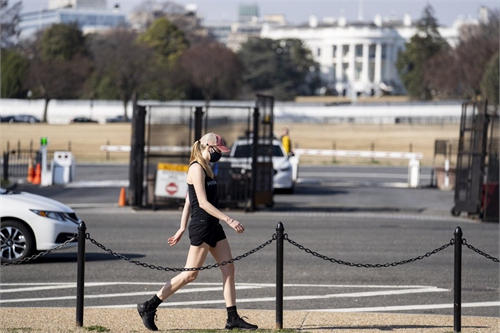It might take 135.6 years to close gap: WEF annual report
Pandemic delays gender parity
The pandemic has rolled back years of progress toward equality between men and women, according to a report released on Wednesday showing the crisis has added decades to the trajectory toward closing the gender gap.

The organization, which usually gathers the global elite in the plush Swiss ski resort of Davos each year, had found in its previous report, published in December 2019 right before the pandemic hit, that gender parity across a range of areas would be reached within 99.5 years. But 2021's report shows the world is not on track to close the gender gap for another 135.6 years.
"Another generation of women will have to wait for gender parity," the WEF said in a statement.
The Geneva-based organization's annual report tracks disparities between the sexes in 156 countries across four areas: education, health, economic opportunity and political empowerment.
On the plus side, women appear to be gradually closing the gender gap in areas such as health and education.
But inequality in the workplace - which has long appeared to be the stickiest area to fix - is still not expected to be erased for another 267.6 years.
And the pandemic has not helped.
The WEF pointed to a study by the UN's International Labour Organization showing that women were more likely to lose their jobs in the crisis, in part because they are disproportionately represented in sectors directly disrupted by lockdowns.
Other surveys have shown that women were carrying a greater share of the burden of increased housework and childcare during lockdowns, contributing to higher stress and lower productivity levels.
Women were also being hired back at a slower rate than men as workplaces opened up again, according to LinkedIn data referenced in the report.
"The pandemic has fundamentally impacted gender equality in both the workplace and the home, rolling back years of progress," WEF managing director Saadia Zahidi said in the statement.
"If we want a dynamic future economy, it is vital for women to be represented in the jobs of tomorrow," she said, stressing that "this is the moment to embed gender parity by design into the recovery.

NASA astronaut Jessica Watkins poses for a portrait, Tuesday, September 15, 2020. Photo: VCG
A range of studies have shown that the COVID-19 pandemic has had a disproportionate impact on women, who have lost jobs at a higher rate than men, and had to take on much more of the extra childcare burden when schools closed. The effects will be felt in the long-term, according to the World Economic Forum, which in its annual Global Gender Gap Report found that the goalposts for gender parity appeared to be moving further away.The organization, which usually gathers the global elite in the plush Swiss ski resort of Davos each year, had found in its previous report, published in December 2019 right before the pandemic hit, that gender parity across a range of areas would be reached within 99.5 years. But 2021's report shows the world is not on track to close the gender gap for another 135.6 years.
"Another generation of women will have to wait for gender parity," the WEF said in a statement.
The Geneva-based organization's annual report tracks disparities between the sexes in 156 countries across four areas: education, health, economic opportunity and political empowerment.
On the plus side, women appear to be gradually closing the gender gap in areas such as health and education.
But inequality in the workplace - which has long appeared to be the stickiest area to fix - is still not expected to be erased for another 267.6 years.
And the pandemic has not helped.
The WEF pointed to a study by the UN's International Labour Organization showing that women were more likely to lose their jobs in the crisis, in part because they are disproportionately represented in sectors directly disrupted by lockdowns.
Other surveys have shown that women were carrying a greater share of the burden of increased housework and childcare during lockdowns, contributing to higher stress and lower productivity levels.
Women were also being hired back at a slower rate than men as workplaces opened up again, according to LinkedIn data referenced in the report.
"The pandemic has fundamentally impacted gender equality in both the workplace and the home, rolling back years of progress," WEF managing director Saadia Zahidi said in the statement.
"If we want a dynamic future economy, it is vital for women to be represented in the jobs of tomorrow," she said, stressing that "this is the moment to embed gender parity by design into the recovery.



